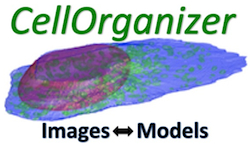CellOrganizer for Docker

The CellOrganizer Docker containers contains binaries for the top-level functions in the Matlab version along with the necessary Matlab libraries (which do not require a license). It also contains a python interface to those binaries that can be used directly from python or through Jupyter notebooks.
Downloads
Instructions on installing Docker and downloading the CellOrganizer for Docker image can be found below
| Release Version | Installation Instructions and Documentation | ||
|---|---|---|---|
| CellOrganizer for Docker v2.10 (Jupyter version) | Click Here | ||
| CellOrganizer for Docker v2.9.0 to v2.9.3 (Jupyter version) | Click Here | ||
| CellOrganizer for Docker v2.8.0 (Jupyter version) | Click Here | ||
| CellOrganizer for Docker v2.7.2 | Click Here | Click Here | Click Here |
| CellOrganizer for Docker v2.7.1 | Click Here |
Important terms
Docker
an open-source project that automates the deployment of software applications inside containers by providing an additional layer of abstraction and automation of OS-level virtualization on Linux.
What are containers?
The industry standard today is to use Virtual Machines (VMs) to run software applications. VMs run applications inside a guest Operating System, which runs on virtual hardware powered by the server’s host OS.
VMs are great at providing full process isolation for applications: there are very few ways a problem in the host operating system can affect the software running in the guest operating system, and vice-versa. But this isolation comes at great cost — the computational overhead spent virtualizing hardware for a guest OS to use is substantial.
Containers take a different approach: by leveraging the low-level mechanics of the host operating system, containers provide most of the isolation of virtual machines at a fraction of the computing power.
- Images – The blueprints of our application which form the basis of containers.
- Containers – Created from Docker images and run the actual application. A list of running containers can be seen using the docker ps command.
- Docker Daemon – The background service running on the host that manages building, running and distributing Docker containers. The daemon is the process that runs in the operating system which clients talk to.
- Docker Client – The command line tool that allows the user to interact with the daemon. More generally, there can be other forms of clients too – such as Kitematic which provide a GUI to the users.
- Docker Hub – A registry of Docker images. You can think of the registry as a directory of all available Docker images. If required, one can host their own Docker registries and can use them for pulling images.
[ taken from: https://docs.docker.com/get-started/overview/]
Recent Posts
- CellOrganizer v2.10 Released June 22, 2023
- New Release! CellOrganizer v2.9.3 November 17, 2021
- MMBioS 2021 Workshop July 29, 2021
- New Release! CellOrganizer v2.9.2 July 13, 2021
- New Release! CellOrganizer v2.9.1 July 12, 2021


